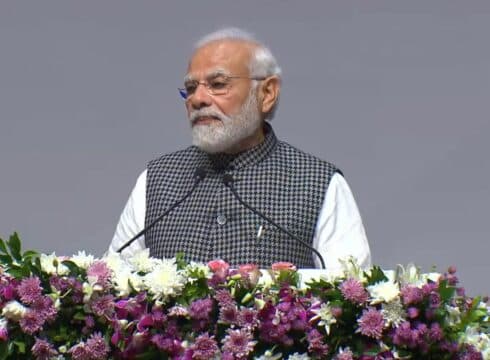This silence is not only about its engineering, but also the beginning of a silent revolution in the country: PM Modi
He was speaking at an event commemorating the 40 years of Maruti Suzuki and the launching of the carmaker’s EV plant
The government has introduced several schemes for the EV sector, including FAME-II and a PLI scheme for advanced cell chemistry for EVs
Inc42 Daily Brief
Stay Ahead With Daily News & Analysis on India’s Tech & Startup Economy
Prime Minister Narendra Modi said electric vehicles (EVs) are bringing a ‘silent revolution’ in the country, alluding to the fact that EVs are generally considered to be silent.
“Be it two-wheelers or four-wheelers, they don’t make any noise. This silence is not only about its engineering, but also the beginning of a silent revolution in the country,” said PM Modi. He was speaking at an event commemorating the 40 years of Maruti Suzuki and the launching of the carmaker’s EV plant.
“To boost supply, work is also being carried out at a fast pace to introduce production-linked incentive schemes in automobile and automobile components manufacturing,” the Prime Minister said.
In this regard, the government has introduced several schemes for the EV sector.
As the name suggests, the Faster Adoption and Manufacturing of (Hybrid &) Electric Vehicles (FAME)-II scheme aims at faster adoption and manufacturing of electric and hybrid vehicles. According to government figures, the scheme has registered 4.75 Lakh sales from 58 original equipment manufacturers (OEMs) since its inception.
Currently, the government is modifying the FAME-II scheme to remove any policy deficiencies that have or might come up. The government has set a tentative deadline of September 1 to implement the new formula and rules related to FAME-II and domestic value addition (DVA).
Further, the Centre has been bullish on creating battery manufacturing capacity within India, as the country remains heavily reliant on battery imports for EV manufacturing. In that regard, the government has introduced the PLI scheme for advanced cell chemistry.
The INR 18,100 Cr-PLI scheme has seen three companies – Ola Electric, Reliance New Energy and Rajesh Exports – sign up to manufacture 98 GWh in battery capacity.
These companies will have two years to set up a manufacturing facility and the government will disburse the incentive over a period of five years on the sale of batteries manufactured in India.
On the issue of batteries, the government is also working on a new set of standards for EV batteries. During the summer season, India saw in excess of 30 incidents of EVs catching fire.
Investigations into the matter by several organisations, including an arm of the Defence Research and Development Organisation (DRDO) put the blame on poor battery manufacturing standards and design. The government is expected to bring the new standards for EV batteries within a month.
Several other states and cities are also taking the initiative to augment sales and registrations of electric vehicles in the country. Recently, Delhi Government announced its plans to install around 18,000 public and semi-public EV charging points by 2024 in the national capital region.
In July 2022, the two-wheeler electric vehicle registrations in India also rose 5% to 44,428 units.
{{#name}}{{name}}{{/name}}{{^name}}-{{/name}}
{{#description}}{{description}}...{{/description}}{{^description}}-{{/description}}
Note: We at Inc42 take our ethics very seriously. More information about it can be found here.


